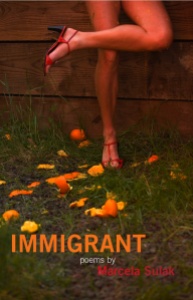Immigrant began as a collection of sonnets rooted in the history, myths and customs surrounding fruits and vegetables, and now it includes snapshots of displaced people recreating themselves and the world in which they find themselves. Marcela Sulak draws upon travels and research for a 500-year history of the Sephardic Jews of Venezuela, and her years in Central Europe as a translator, and her early years on a rice-farm in Texas, describing immigrants of all kinds, and showing how deeply connected we are.
About the Author
 Marcela Malek Sulak is the author of the poetry chapbook Of All the Things That Don’t Exist, I Love You Best (Finishing Line Press, 2008). She has translated three book-length collections of poetry, Karel Hynek Macha’s May and Karel Jaromir Erben’s Bouquet, from the Czech (Twisted Spoon Press, 2005 & forthcoming in 2010) and Mutombo Nkulu-N’Sengha’s Bela-Wenda, from the French (Host Publications, forthcoming in 2010). Her poetry has recently appeared in such journals as Fence, The Indiana Review, Drunken Boat, River Styx and The Notre Dame Review. She has lived and worked as a free-lance writer and instructor in Germany, the Czech Republic, Venezuela and Israel. She has worked as an Assistant Professor of Literature at American University and currently directs the Shaindy Rudoff Graduate Program in Creative Writing at Bar-Ilan University.
Marcela Malek Sulak is the author of the poetry chapbook Of All the Things That Don’t Exist, I Love You Best (Finishing Line Press, 2008). She has translated three book-length collections of poetry, Karel Hynek Macha’s May and Karel Jaromir Erben’s Bouquet, from the Czech (Twisted Spoon Press, 2005 & forthcoming in 2010) and Mutombo Nkulu-N’Sengha’s Bela-Wenda, from the French (Host Publications, forthcoming in 2010). Her poetry has recently appeared in such journals as Fence, The Indiana Review, Drunken Boat, River Styx and The Notre Dame Review. She has lived and worked as a free-lance writer and instructor in Germany, the Czech Republic, Venezuela and Israel. She has worked as an Assistant Professor of Literature at American University and currently directs the Shaindy Rudoff Graduate Program in Creative Writing at Bar-Ilan University.
Advance Praise
 Raised to mend walls in rural Texas, Marcela Sulak in this startling first book offers us a new cartography where the senses she excels at making sense of render new and revelatory topographies and meteorologies of this vast human world. Here fallen fruit and workaday vegetables as well as the speechless and those stunned by the beauty of the world remind us of the world’s consummate sweetness and chafing griefs…Sulak’s poems, laden with precise and exquisite images and transcribed with deft diction and prosodic command, confirm to us that the heart is our deepest thinker, an immigrant displaying all her documents and remaining the indomitable keeper of our open secrets and secret joys. –Khaled Mattawa
Raised to mend walls in rural Texas, Marcela Sulak in this startling first book offers us a new cartography where the senses she excels at making sense of render new and revelatory topographies and meteorologies of this vast human world. Here fallen fruit and workaday vegetables as well as the speechless and those stunned by the beauty of the world remind us of the world’s consummate sweetness and chafing griefs…Sulak’s poems, laden with precise and exquisite images and transcribed with deft diction and prosodic command, confirm to us that the heart is our deepest thinker, an immigrant displaying all her documents and remaining the indomitable keeper of our open secrets and secret joys. –Khaled Mattawa
In a book of visions, earth-fruits, and every kind of migration, Marcela Sulak writes poems that leap from place to place, from spirit to spirit, drawing connections where we would never have seen them. She is at home wherever she finds herself, and with her natural ability to identify with the exile and traveler, she never sees the world as exotic, instead her poems show us how deeply connected we are to each other, even to other creatures, even to plants. These are poems that reach outward and inward at the same time, poems full of tenderness and love for the world. –Anne Marie Macari
Marcela Sulak has done something very strange and wonderful. She has given us a kind of history of humanity, or a history made human, as told through fruits and vegetables, often in sonnet form, though the ghazal, the haiku and the tanka sprout in this garden as well. These are poems of wild vegetable hair and sexy skin and fruit, like the radish that makes us recall “how Egyptian women dyed / their nipples scarlet.” These are histories of roots and of the uprooting, of the migration of recipes and cultures and peoples. These are the deep mind where Sulak plants her seed, and then the lyrical bursting upward of her words dazzling the palate, blossoming the tongue. It’s a wonderful recipe that will feed you again and again. Eat this book. –Tony Barnstone
Excerpt
Avocado
Wound tight inside the avocado
we once found a perfect copy
of the tree in miniature,
pale, translucent leaves unfurling,
coiled strings of roots, a stem
that split the pit. We didn’t have
the heart to toss it out, crowned
with coffee grounds and newspaper.
In the end, the landlady took it
with the rent. She said she’d plant it
among the rocks and jagged shade
against the southern slope for strength
since silky avocado flesh
thrives under adverse conditions.
Immigrant (ISBN: 978-0-982622-8-7, $14) is available from Black Lawrence Press.

